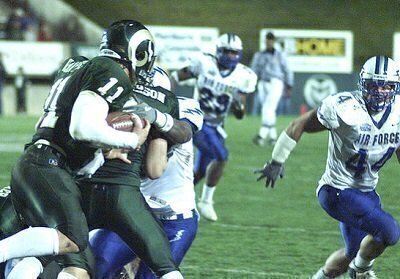A dispute over power sharing between the federal government and state government leads off a big week of Supreme Court cases on Monday.
 In a double-header that will attach the interest of many court watchers, the nine Justices will tackle a case nominally about football and sports gambling: Christie v. NCAA Then on Tuesday, one of the biggest cases of the current term gets the Court’s undisputed attention: Masterpiece Cakeshop, Ltd. v. Colorado Civil Rights Commission.
In a double-header that will attach the interest of many court watchers, the nine Justices will tackle a case nominally about football and sports gambling: Christie v. NCAA Then on Tuesday, one of the biggest cases of the current term gets the Court’s undisputed attention: Masterpiece Cakeshop, Ltd. v. Colorado Civil Rights Commission.
Both controversies had been in the legal system for years, and they involve core constitutional issues.
In the Christie case, the Justices will consider if a federal law that limits sports betting in New Jersey violates the 10th Amendment’s anti-commandeering clause. The 10th Amendment says that, “The powers not delegated to the United States by the Constitution, nor prohibited by it to the States, are reserved to the States respectively, or to the people.” Since 1976, several Supreme Court decisions have found that it was the amendment’s intent to limit the ability of the federal government to “commandeer” state officials or a state legislative process.
In the New Jersey sports betting cases, the Third Circuit federal appeals court in 2013 said against New Jersey’s challenge to the federal Professional and Amateur Sports Protection Act. The statute had allowed Nevada and several other states to have sports betting, but New Jersey decided not to apply for permission to do so. Instead, decades later it enacted its own law to control sports betting. The Supreme Court didn’t take an appeal from the state in 2014.
New Jersey then tried a different tactic. It repealed state regulations on gambling to make it “a purely private matter.” The NCAA and the major professional sports organizations sued New Jersey and won in court. The state is now appealing that decision in the Supreme Court.
New Jersey believes the appeals court in the second case went too far. “The majority thus reached the remarkable and unprecedented conclusion that the Constitution’s federal structure affords to Congress the power to prohibit States from repealing their own laws,” it said.
On Tuesday, the Court only has one case on its schedule, the cake case. In Masterpiece Cakeshop, the question before the court is if a state can constitutionally enforce a civil rights law against a bakery whose owner declined, for First Amendment free speech and religious reasons, to make a cake for a same-sex couple’s wedding party.
Jack Phillips and his wife own a business in Colorado, where as a cake artist Phillips designs cakes. When approached by a same-sex couple about making a cake for their wedding, Phillips declined to design a cake with that message, but he offered to make any another cake for them that didn’t conflict with his beliefs.
The couple declined that offer and then filed a complaint with the Colorado Rights Commission, which ruled that Masterpiece Cakeshop violated the Colorado Anti-Discrimination Act (or CADA) and it ordered the business to create same-sex marriage wedding cakes if it also created other wedding cakes.
The state believes the core issue in the case goes beyond expressive free speech. “Everyone agrees that the government cannot force people or entities to ‘speak,’” it says, citing previous cases that allowed school children to forgo saying the Pledge of Allegiance and the right of the free press to deny publishing political commentary.
“Phillips demands respect for his religious beliefs, and that respect is secured by the Constitution. But under that same Constitution, a religious belief is no justification for a State—or a business open to the general public—to treat a class of people as inferior simply because of who they are,” the state concludes.







